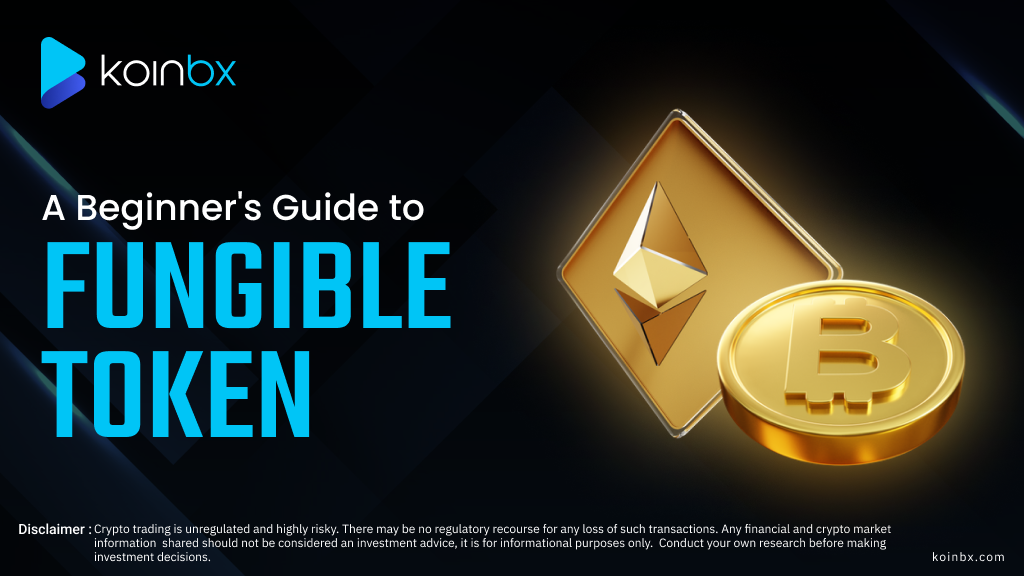The world of crypto can be both exhilarating and overwhelming for beginners. You have probably heard the terms "Bitcoin," "Ethereum," and maybe even "NFTs." But in the ever-evolving world of cryptos and blockchain, there is a lot more to explore beyond these terms. As we all know, managing your portfolio in crypto requires some level of knowledge. Without understanding the terms of crypto, you risk missing opportunities or, worse, making costly mistakes.
In this guide, we will dive into the world of fungible tokens, explain their mechanics, and explore how they work within the blockchain ecosystem. This guide will help you understand what fungible tokens are and why they matter.
What are Fungible Tokens?
At their core, fungible tokens are digital assets that are interchangeable with one another. Imagine you lend a friend ?100, and they return two ?50 notes. The value remains the same, regardless of the individual notes given back. Fungible tokens in the crypto world follow this same principle.
In simpler terms, fungibility means each token is identical and can be exchanged with any other of the same kind without losing its value. This interchangeability is what makes fungible tokens perfect for use as a medium of exchange, just like traditional money.
Take the Indian Rupee (INR), for example. A 10-note can be swapped for another 10-note, and there’s no difference between them. This is because the value associated with the notes remains constant, no matter which specific bill you hold. This same principle applies to fungible tokens in the blockchain.
Now that we know the definition, let’s move on to how these tokens actually work on a blockchain platform.
How Do Fungible Tokens Work?
To understand how fungible tokens operate, it’s essential to first grasp how blockchains work. A blockchain is a decentralized ledger where all transactions are recorded in a transparent and immutable way. Fungible tokens are created, or “minted,” on these blockchain platforms, and they follow a few key processes.
Here’s a step-by-step breakdown:
1. Minting the Tokens: Fungible tokens are minted (created) via a smart contract. Once minted, these tokens are assigned to specific digital wallets. Each wallet holder is the owner of these tokens, and they are now part of the blockchain's ecosystem.
2. Ownership Assignment: Once the tokens are in your wallet, you officially "own" them. The blockchain ensures that the tokens are secure and that ownership can be transferred easily from one wallet to another.
3. Seamless Transferability: The beauty of fungible tokens lies in their transferability. You can send these tokens to another user, and they will retain the same value regardless of who holds them. The blockchain records every transaction, ensuring a transparent, traceable history of ownership.
4. Divisibility: One notable feature of fungible tokens is their divisibility. Let’s take Bitcoin (BTC) as an example. Each Bitcoin can be broken down into smaller units called Satoshis (1 BTC = 100 million Satoshis). This divisibility makes microtransactions possible and allows for more flexibility in trading.
5. Cross-Platform Usability: Fungible tokens are often compatible across different platforms and applications. This makes them incredibly versatile in the crypto world, enabling you to use them for various purposes like digital payments, staking, or even remittances.
Fungible tokens simplify digital trading by acting as the backbone of digital currencies and assets. Whether you're making payments, transferring assets, or trading on an exchange, fungible tokens keep the gears of the blockchain running smoothly.
Examples of Fungible Tokens
To understand the concept of fungible tokens even further, let’s look at some of the most popular fungible tokens in the crypto world:
Bitcoin (BTC): As the first and most famous crypto asset, Bitcoin represents the perfect example of a fungible token. One BTC can be exchanged for another BTC without any difference in value, making it the most widely recognized and used fungible token.
Ethereum (ETH): While Ethereum is primarily known as a platform for decentralized applications, its native token Ether (ETH) is a fungible token. Ether is used to power transactions and smart contracts within the Ethereum network, making it an essential part of the blockchain ecosystem.
Ripple (XRP): Ripple is designed for fast and low-cost cross-border payments. Its native token, XRP, is a fungible token that facilitates financial institutions' transactions around the world, particularly for remittances.
Litecoin (LTC): Often referred to as the “silver to Bitcoin’s gold,” Litecoin offers quicker transaction times. It’s used for day-to-day transactions and is yet another example of a fungible token.
Fungible tokens can be found in a wide variety of use cases, from payments and staking to digital investments.
Final Thoughts
Fungible tokens are an essential part of the blockchain ecosystem, providing a way to digitally represent and exchange value. As the crypto world continues to grow, understanding these tokens is critical for anyone looking to trade, invest, or simply learn about crypto assets.
At KoinBX, we are committed to making the trading of fungible tokens seamless and accessible. Whether you are buying Bitcoin, Ethereum, or any other fungible token, KoinBX offers a secure platform for trading in India. By grasping the basics of fungible tokens, you empower yourself to make informed decisions and explore the exciting opportunities in the crypto space.
As the backbone of digital payments, fungible tokens are reshaping how we interact with money and assets. So, the next time you hear the term "fungible token," you will know exactly what it means and how it fits into your crypto journey.
If you are interested in trading fungible tokens, head to koinbx.com and start trading your favourite tokens today!
Download KoinBX Android App | Download KoinBX iOS App
Disclaimer: Any financial and crypto market information shared should not be considered investment advice. It is for informational purposes only. Conduct your own research before making investment decisions. Crypto trading is unregulated and highly risky. There may be no regulatory recourse for any loss of such transactions.






Comments